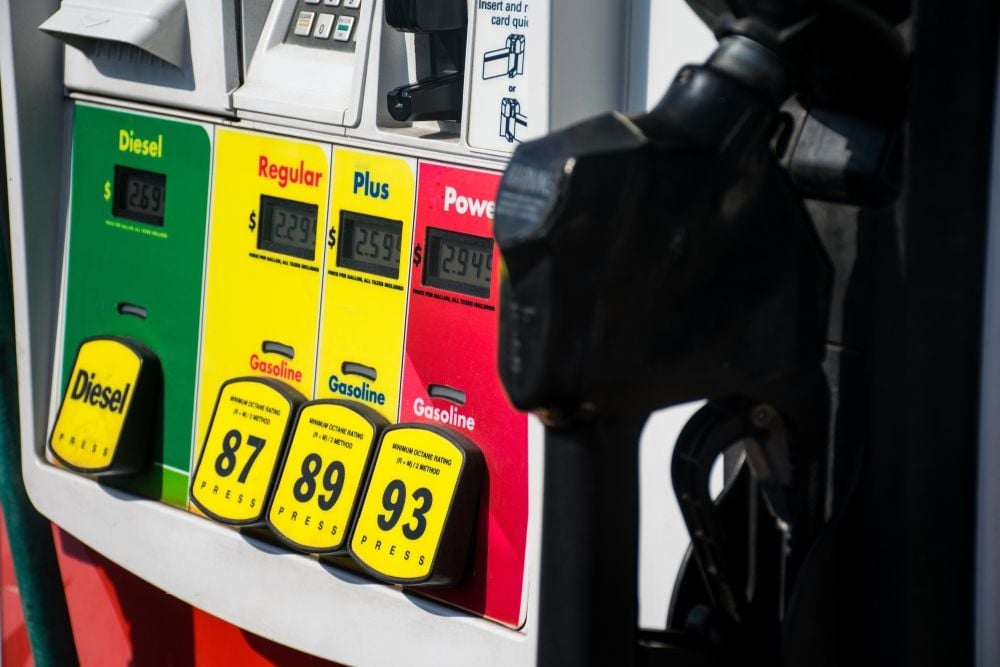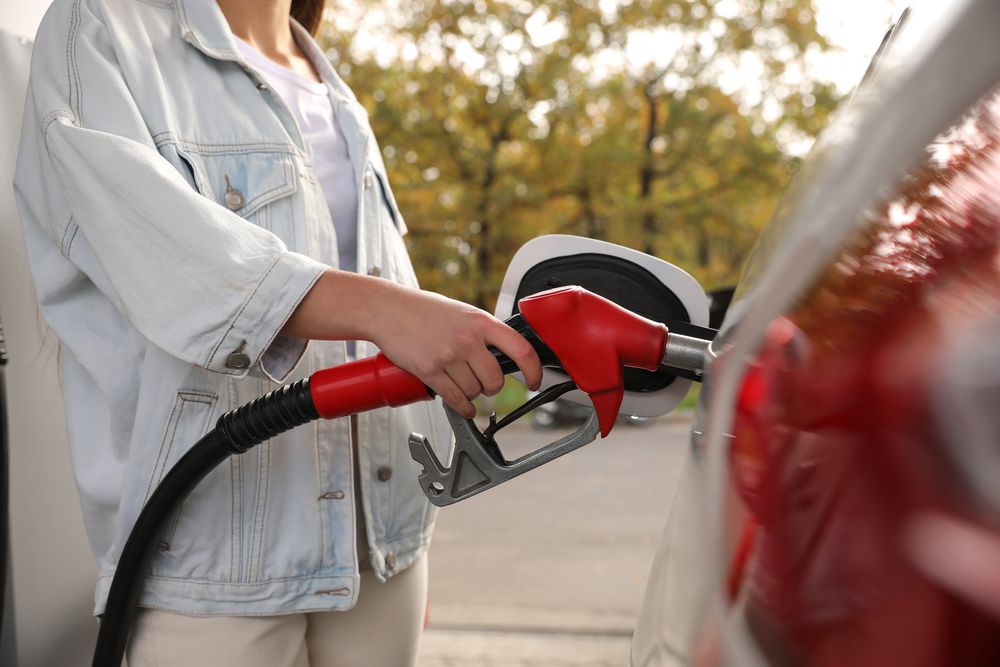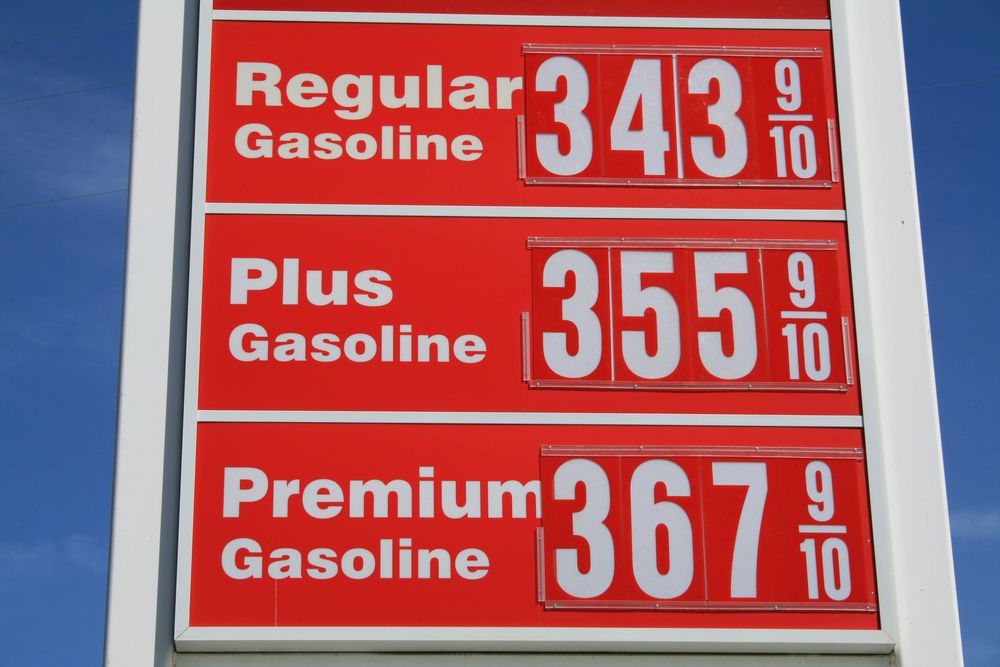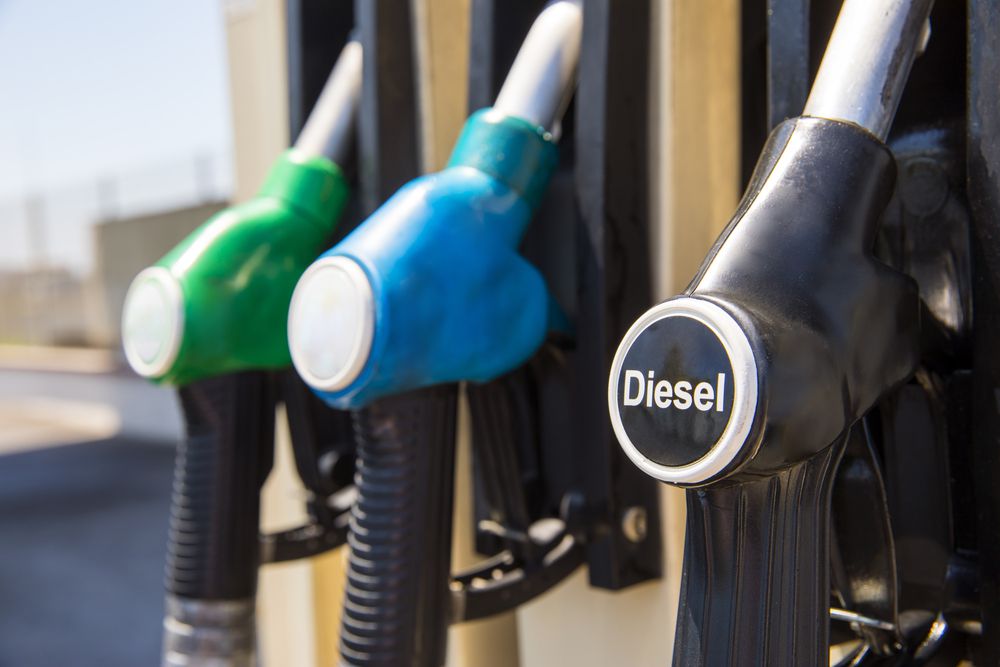
When considering what to put in your car, you may be wondering what the difference is between regular gas and unleaded gas.
Is unleaded gas the regular kind? Can you put unleaded gas in a regular car? Does regular mean unleaded?
Unleaded gas is considered regular gas since leaded gas was outlawed in the '70s and is no longer in gas stations. Unleaded gas is the industry standard for motorized vehicles and has a higher octane rating than leaded gas.
There's a lot to go into when discussing the differences between leaded and unleaded gas and the fascinating history of the gas industry to be explored.
The rest of this article will address unleaded gas vs. diesel and answer whether unleaded gas is regular gas.
 A selection of octanes, along with diesel, at the gas station
A selection of octanes, along with diesel, at the gas station
Is Regular Gas and Unleaded Gas the Same Thing?
Regular gas, aka what you get on your regular fill-up, is the same as unleaded gas.
Gasoline has been unleaded since leaded gas was put on a timetable to be phased out in the 1970s.
By 1975, unleaded gas was introduced and widely available to consumers; although, at the time, it was a subject of great controversy.
Due to the environmental impact of leaded gasoline, unleaded gasoline was introduced as a more environmentally friendly alternative.
As of January 1, 1996, leaded gas is banned in commercial use, except for planes, marine engines, farm equipment, race cars, and classic cars.
So you can rest assured that everything you're putting in your car is unleaded.
Can I Put Unleaded Gas in My Car?
Unleaded gas is a standard car fuel and is perfectly safe for your car unless you have a diesel engine.
Diesel engines have a different ignition method and use diesel as a fuel source, not gasoline.
Consult your owner's manual to see what kind of vehicle you have.
 Fueling up a car with regular gas
Fueling up a car with regular gas
What Is Regular Gas?
'Regular gas,' as people refer to it, is unleaded gas used in most motorized vehicles. Regular, low octane, unleaded gas is what you'll find at all gas stations and is usually the most inexpensive.
Unleaded Gas vs. Premium?
Unleaded gas and premium gas differ slightly in composition, affecting how they combust in your engine.
Some high-performance and luxury vehicles require premium gas.
In short, premium gas requires more compressive force before it detonates, giving your vehicle an improved fuel economy. This prevents preignition and knocking.
The compressive force required before detonation is referred to as the octane rating.
Premium gas has an octane rating of 91 or higher.
 High octane gas is virtually always more expensive
High octane gas is virtually always more expensive
Is Unleaded Gas Diesel?
Unleaded gas is not the same as diesel, and you should never put diesel in a car that takes unleaded gas or vice versa.
Doing so will mess up your engine components and cause them to malfunction.
What Number Is Unleaded Gas?
Unleaded gas is anything at the gas pump that doesn't say diesel or ethanol.
Whatever the number, it's unleaded since unleaded gas has been gone from the pumps since the '90s.
The number refers to the octane rating, affecting detonation resistance.
Can I Use Regular Unleaded Instead of Premium?
You can certainly use regular unleaded instead of premium gas if you want.
While premium gas can get you better mileage and offers a bit more longevity when it comes to maintenance, there's nothing bad about putting regular unleaded in your car (just don't put diesel in).
If you put regular into a car that requires premium and the car runs poorly, you can add an octane booster to up the octane rating of the gas in your tank.
How Can You Tell If Gas Is Unleaded?
Gas is unleaded if it doesn't say ethanol or diesel at the pump.
When you're looking at the options, the unleaded ones have one of several numbers on them. 87, 89, 93, etc. These octane numbers represent the gasolines resistance to knocking (detonation). The higher the more resistant.
Does Premium Gas Have Ethanol?
Premium gas and regular gas contain the same amount of ethanol. The only difference between them is that premium gas has a higher octane rating, giving it a higher detonation resistance than regular gas.
What Are the Different Types of Unleaded Fuel?
Different types of unleaded fuel include E10 and octane ratings up to 98.
E10 is a mixture of 10% ethanol and 90% gas, but you should never use E10 if your car isn't flex-fuel certified. If your car is flex-fuel certified, your gas gap will be yellow or have a yellow ring on the fill line.
Even so, you might not want to use E10 if you've been using unleaded.
Octane ratings up to 91 are considered regular gas, while gas indicated with a 91 or higher is considered premium gas.
Premium gas resists knocking, aka premature detonating in the engine, better than regular gas, offering more power, and is usually recommended for performance engines, but check the owner's manual
What Are the 3 Types of Gasoline?
You might find three types of gasoline at the pump: unleaded, ethanol, and diesel.
Unleaded gas is your typical gas that many motorists use, composed of fossil fuels.
At the right moment, an air/fuel mixture is injected into the combustion chamber and ignited with a spark to fire the pistons and power the vehicle.
Ethanol is a high octane alternative that is more environmentally friendly than unleaded gasoline since it's refined from plants.
Mixed with gas, ethanol offers more power but doesn't last as long as other types of gas.
Diesel is generally used for larger and more powerful engines and is ignited from the force of compression, not a spark generated from the engine.
Gasoline is not compatible with diesel engines, and diesel is not compatible with gas-powered engines.
 Black diesel fuel nozzle
Black diesel fuel nozzle
Which Gas Is Better: 87, 89, Or 93?
87, 89, and 93 represent octane ratings. Different engines are designed for different octane fuels.
If your car's owner's manual recommends 87 octane regular fuel, that is what you should use. Likewise, if your owner's manual calls for 93 octane, use that!
What Is the Best Gas to Put in Your Car?
The best gas to put in your car is the one that's right for your car.
Some cars require medium to high octane gas and won't run well if you use regular unleaded.
Other cars can use ethanol (as high as an 85% mixture), although there are some cons to using ethanol.
Consult your owner's manual to find out what octane rating you should use in your car.
What Happens If I Accidentally Put the Wrong Gas in My Car?
If you accidentally put in premium gas instead of unleaded or mix different types of unleaded gas, you shouldn't expect to see any serious issues arise; however, try to avoid putting in unleaded regular gas if you have a medium or high octane requirement for your vehicle.
If you put regular gas in a car that requires premium, octane boosters are available at most auto parts shops.
Your vehicle will likely still run, but not well.
What happens if I put diesel in a gas car?
Diesel fuel is heavier (denser) than gasoline, so it will sink to the bottom of your gas tank. As a result, it may “gel up,” give your fuel pump problems and clog up your fuel filter.
A small amount of diesel, 2% of total fuel volume, will lower the octane rating of your total fuel by about 1 point; 10% diesel will reduce your octane rating by 10% and give most engines problems.
If you get diesel fuel in your gas tank, it is best not to run your vehicle and tow it to a mechanic so they can properly drain and flush your system.
What happens if I put gas in a diesel car?
Even less than 1% gas contamination will lower the overall flashpoint of the diesel fuel enough to significantly damage components like the injectors or fuel pump and even damage the engine itself.
Fixing a diesel engine is very expensive, so even if you suspect just a tiny amount of gasoline in your diesel fuel tank, it is advisable not to start the motor.
Get the vehicle towed to a mechanic to drain the fuel tank properly.
Is It Ok To Mix Regular Unleaded Gas with Premium Unleaded Gas?
It's ok to mix regular gas with premium gas if you want to. There's no serious problem with mixing the two.
The premium helps your engine run a little better, but there are no adverse interactions between the two types that will damage your engine if you put regular in one day and premium the next.
Conclusion
Leaded gas hasn't been a thing except in specialized cases since the '90s.
You certainly won't be finding it at your average gas pump nowadays.
The three types of gas you can expect to find at gas pumps are unleaded, diesel, and ethanol.
Unleaded is compatible with gas-powered engines, diesel is compatible with diesel engines, and ethanol is suitable for flex-fuel certified vehicles.
Unleaded gas is the same thing as regular gas―the unleaded is just a holdover to distinguish it from leaded gas, which began to phase out in the '70s.
Unleaded gas is safe for your car if you have a gas engine, and for the most part, it's okay to use regular or premium gas in most engines.
The word premium simply refers to the high octane that allows it to resist knocking, or premature firing, making the stroke cycle more efficient overall.
As long as you're using the correct gas type, you're perfectly safe to use unleaded at the pump.
FAQ
Is E10 Gas Regular Unleaded Gas?
E10 gas is not the same as regular unleaded gas and shouldn't be used if you don't know what you're doing.
E stands for ethanol, and the 10 indicates the percentage of ethanol compared to fuel in the mixture.
Most new cars are flex-fuel certified, but your car will likely not take ethanol if you have an older model.
It will damage the seals and filters in your engine, causing it to malfunction and break down over time.
It'll even give you a little better power in your vehicle, but although it might be cheaper at the gas pump, it won't give you as good mileage as unleaded gas.
Additionally, due to the way the ethanol acts as a solvent, if you're switching over to ethanol, you may have issues with a low octane mixture for a while until your fuel tank sorts itself out.
You can check for and siphon out the water in your tank, add a cleaner, and fill up entirely on E10 for a while to reduce the amount of time you'll be experiencing phase separation.